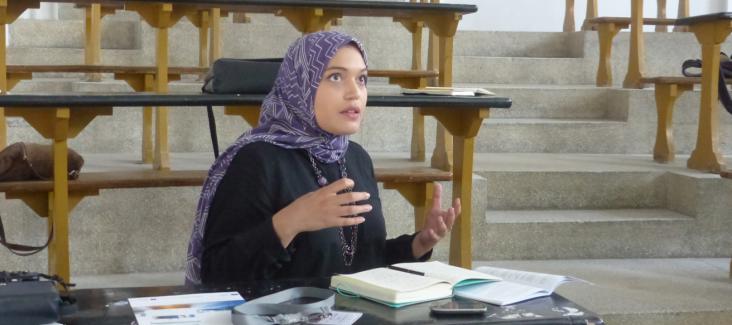To start with, what's the political situation in Tunsia after the Jasmine revolution of 2011?
The revolution had two main achievements: Tunisian people can now enjoy political and civil rights, they are guaranteed by the Tunisian Constitution. However, social rights are not completely guaranteed, and people cannot fully enjoy them yet. This will be the battle for the coming decade: How to make Tunisians have a better life in terms of employment, health care and education. These are the three main challenges for modern Tunisia.
At the Global Forum there is a lot of talk about democracy. What do you see as the biggest challenge with regards to implementing democracy in Tunisia?
It is about making the Tunisian people understand that they can be an actor of democracy and that they are not merely political recipients. Tunisians must be citizens who want to be active in their local community, they need to know how to push for their best decisions and how to influcene authorities so that their governance fits the general interest. Right now, in view of the upcoming local elections in 2017, Tunisia is very much challenged. We have two years' time to prepare the Tunsian people for these elections.
What do you think of direct democracy?
Direct democracy is all about making your life better. We should create our own model of direct democracy, the Constitution provides for the Referendum, it’s essential but not enough, we need other legal instruments of direct democracy, like the right to petition for example, as they do not exist in our legal system. We try to invent our own way to live direct democracy, for example in my organization we trained 25 young activists to draft policy papers, so they can initiate a change in public policies. I consider direct democracy very important at local level, this is where citizens are closer to the politicians, and can have a direct impact.
At the Global Forum, there was a working session on "direct democracy and Islam". How do these two things go together for you?
At the session you are referring to, Rached Ghannounchi, key figure of the [Tunisian] Ennahdha Party and a very prominent Islamic thinker, said that "Islam is all about direct democracy". I agree, Islam is built on the principle of Choura, which means consultation. Also in the Quran, you can find a verse about the Queen of Saba - she says “Advise me in this affair, I will not command before to hear your opinions", which I interpret as that we need deliberations and that we need to take our decisions commonly. Moreover, you can find roots of direct democracy in Sunnah, the way of life prescribed by the prophet Muhammad. So direct democracy has its place in Tunisia, there is no contradiction between Islam and direct democracy at all.
What about women and democracy? Is there equality between women and men in Tunisia?
We are on a good path. Tunsia has more female deputies in the national parliament than France, that's already an achievement! When the new Constitution was drafted from 2011 - 2014, women spoke up and fought hard for equality to be enshrined in the Constitution. Women MPs from liberal and conservative parties even allied during this battle, and they were successful: Gender equality is written down in the Constitution that was adopted in January 2014.
The new Constitution also stipulates equal representation in elections. It demands "vertical equality", which means that a political party list equally puts up male and femal candidate in strict order. Now we must ensure that women are put first on the lists as often only the first candidate (of small parties) is successful, this is wht we call "horizontal" representation.
And to be honest: there are still huge challenges: Women earn thirty per cent less than men in Tunisia. Women suffer from the "double burden". In contrast to men, Tunsian women have the "right" to work twice: At home and in the office. Also men need to understand that they have duties and work to do at home.
What do you want to see realised within the next five years?
Let me point out three crucial challenges:
The first one is transitional justice: We cannot build a new society without reconciliaiton. We need to reveal the truth about what happened during dictatorship in order to build a truly democratic society.
The second challenge is developing the internal regions. During dictatorship the regions of Tunisia suffered from very big inequality. The coastal regions in the North and Eas were always privileged, while the State completely ignored the internal regions and the South. We definitely need ro inject more investment in these regions.
Thirdly, education is biggest challenge of post-revolutionary Tunsia. How to modernise education system, how to educate young responsible citizens so that they feel included? - These are urgent questions I want to see to be solved. This is because it all comes from education.
And personally, what is your dream?
My dream is that young people in Tunisia feel that their country is offering something to them, that they can fully develop in this country so that they do not have to dream of achieveing their dreams abroad. Particularly, I am thinking of the next generation. It was my generation that made the revolution but it will be the next generation that will make our dreams come true.
Interview and photo by Cora Pfafferott

